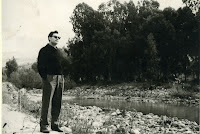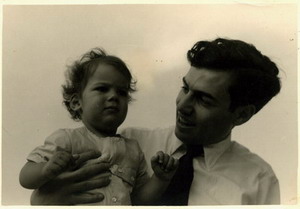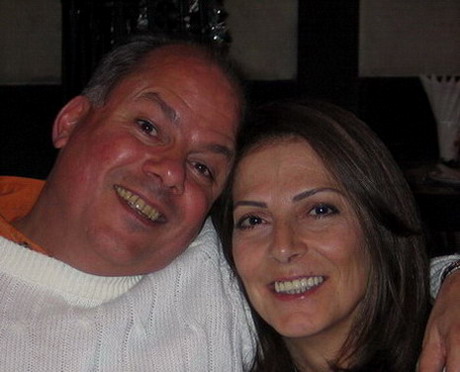Solhi was 22 years old when I was born. In later years my mother would say that he was too young then to become a father, but he was much older than that age. By then he already had a vision and a future planned. He knew he had many obstacles to overcome, and he was ready for them. Now he had a massive incentive.
My coming would change his life. My coming into his life had a profound effect on him. From as far back as I can remember into my childhood I remember being flooded with love and affection. 6 months after I was born my father took me and my mother to Damascus. I was the first born to any of Hamed’s children, and that was a great source of pride to Solhi.
Over the next few years we travelled a lot; between London, Damascus and Baghdad. In those days travel was a long drawn out affair. Many times we travelled between Damascus and Baghdad by car, a 16 hour journey, much of it on dirt roads. Flights also lasted much longer than they do now, and Hamsa and I must have been a burden, but we remember little of it.
From as early I can remember Solhi insisted that I call him Solhi. He wanted me to be as one with him. Hamsa and Diala, who was born on 20th July 1962, followed on from that lead. Hierarchy and tradition had no place in his life.



Left, Hamsa and I in London. Middle, Hamsa and I in Damascus, Hamsa had Mumps and Mum wanted me to be infected at the same time, feeding us from the same spoon, but I never did get infected. Right, Hamsa and I in the countryside in Syria
Left, Hamsa kissing Diala. Right, Hamsa, Diala and I.
From a very early age he started indoctrinating us to enjoy music. I was about 5 years old when I had my first lesson playing the violin. It didn’t take long for Solhi to accept that the violin was not the instrument for me, so my mother took over the mantle and I started piano lessons. My mother was always much more patient, and so the efforts to get me to show some form of stubbornly latent talent took longer, but the end result was the same. It must have come as disappointment to Solhi that I didn’t show any signs of child prodigality but he never showed it. In the meantime Hamsa, in stark contradiction to me, showed early signs of brilliant talent.
Like me, Hamsa did not escape the trials to find musical talent. She went through the violin trial period with no success, but when she was put in front of a piano, a miracle happened. She took to the piano like a duck takes to water. And to Solhi’s delight, a child of his showed serious musical talent.
Solhi was an exceptionally serious person. He admired Beethoven and Wagner, and marvelled at their moody genius. He deliberated over the talents of Mozart and Schubert and wondered at their potential output if they’d survived beyond their early 30’s. He studied with fascination the bold music of Mahler and Shostakovich. He drew much of his inspiration from their lives.






In Syria, in a river top left, Zabadani top middle, Busra top right, near Tartous bottom left, Ghouta bottom middle, and Busra bottom right
Solhi also loved animals. From as early as I remember into our childhood we were surrounded by cats, dogs, birds, fish. Solhi could not walk past a wounded or hungry animal without picking it up and bringing it home. Some of those animals are still alive today! Solhi loved Salukis. He considered them regal dogs. But Solhi’s pride and joy was a Russian Borzoi named Boris.



Solhi with Boris the Russian Borzoi
When I grew older he would take me on hunting trips with his friends. Those were magical times. Waking up well before dawn and travelling long distances, and then walking miles on hunting trips were always occasions I relished. They were adventures every young man dreams of, you could never predict what would happen. I remember one time, in miserable weather conditions, we strayed by mistake into Lebanon and ended up in a village somewhere near Mount Hermon. The only way we could tell we were in Lebanon was when we saw shops selling Coca Cola and good quality shotgun cartridges. These things were not available in Syria then. We didn’t pass any border point, and we didn’t even have our passports with us. We must have followed a smuggling route and inadvertently ended up in Lebanon. We returned the same way, and I had an amazing story to tell my friends. In those days going to Lebanon was an exotic occasion, and doing it without passports and without being detected made it even more exotic. In later years I would end up going to high school there, legitimately. And many years later I would even settle there, also legitimately.













Solhi with various hunting partners and friends, among them Salim Aboud and Michel Kilo, and myself
Solhi was a stern father. Partly due to his own spoiled childhood, and partly due to his strong personality, he raised us with an iron fist, literally. None of us escaped his famous “knuckle knock” when we’d done something he did not approve of. That would be a hard knock on the forehead with the 2nd joint of his third finger. Painful and effective. Just as painful and probably more effective was the just-as-famous raised-eyebrow frown.
Receiving a dressing down in Busra
But Solhi was also very proud of us, and always strove to pass on his knowledge to us. On many occasions he would sit Hamsa and me down and, with volume blaring, play records of famous compositions, and tell us the stories behind the compositions and the composers. He would bring out the score sheets and teach us to follow the score. Then there would be the spot checks: “What instrument is this?”, “What key is this?”, “What speed is this?” and so on. This type of quizzing was not limited to music, he instilled in us many of life’s values this way.


































































7 comments:
Wonderful wonderful memories, Sarmad. And never too late to tell the story. You have inherited creativity in your gift for writing and expression. Looking forward to future instalments and to seeing some more of the photgraphic archive. How marvellous to have all these reminders.
Thanks for sharing these memories.
This brought some chuckles and smiles as well as some tears.The Siamese cat was called "Sodat" because he had black balls.
Diala
That brought some chuckles and smiles as well as a few tears. Pets in our house were names after renowned figures and prophets,as well for the fun of it. The Siamese cat was called "Sodat".I leave it up to your imagination to guess why.
Love
Diala
Sarmad, that's very nice! I only wish Solhi knew what a happy impact all those moments made on us, he would have been so glad (today is his birthday, as you know!). I wish we told him all this when he was alive. Let's hope he is watching from somewhere, wherever he is now.
Continue writing and putting those great pictures! Thanks!
Follow up to Diala's comment. The dog on the balcony with Solhi amongst the plants was Flocky. The Alsation with Diala and Hamsa was Stella, named after the Egyptian brewed beer brand. The two Alsations with Solhi were Stella and Willy. Willy was gifted to the Police Force after he bit me and later Diala.
Diala, do you remember the name of the black cat, you were probably too young to remember him. And no cheating by asking Mum! Hamsa might remember. He was named after a Zairean African activist leader who was assassinated.
I remember, Lumumba! :)
Sarmad, I enjoyed reading about your father and grand father. You have told a very interesting story about your father and his life. I can tell from your writing that you love his immensely and he would be proud to read your tribute.
Post a Comment